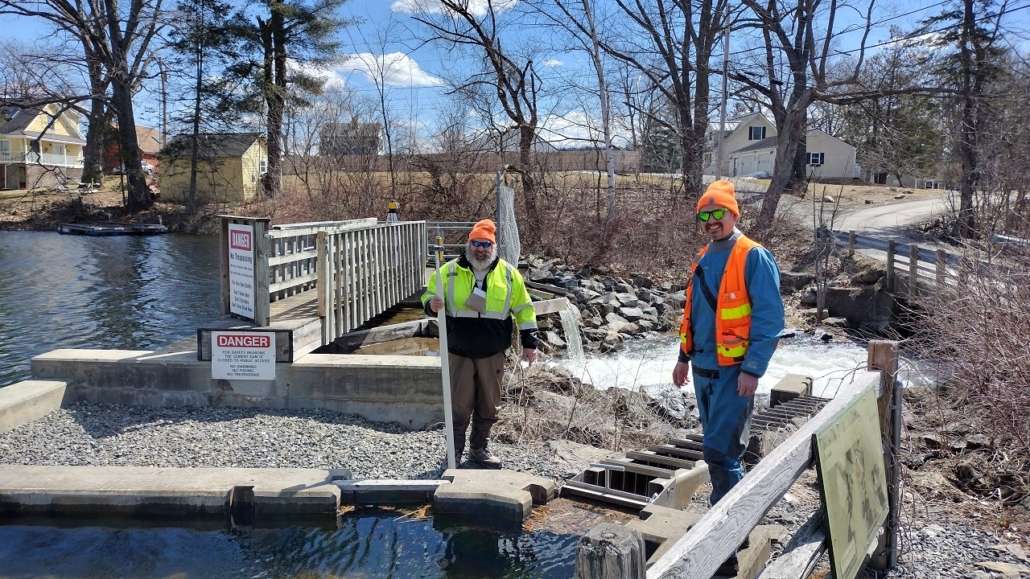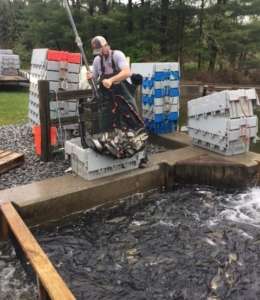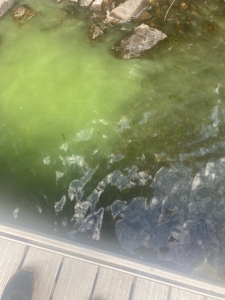Webber and Threemile ponds restoration work update

Nate Gray, left, from Maine Department of Marine Resources and Bill Bennett, USFWS, prepare to collect flow data from Webber Pond.
(contributed photo)
by Landis Hudson, Maine Rivers
Project partners who worked on and completed the China Lake Alewife Restoration Initiative are turning their attention to Webber Pond, Threemile Pond and Seaward Mills Stream. The seven-year China Lake project involved fully removing three dams and installing fishways at three other dams. In 2022 more than 800,000 adult alewives were counted moving into the lake, producing vast numbers of juveniles that were able to safely migrate out of the lake.
The earlier success of alewife restoration work at Webber Pond helped lay the groundwork for the China Lake effort. In 2009, after years of effort and planning by Maine Department of Marine Resources and the Webber Pond Association, a technical Alaskan steep-pass fishway was installed to allow fish into Webber Pond. The restoration effort has been so successful that the Webber Pond fishway is now undersized for the number of returning fish, and some fish are delayed below the dam. Many of the fish entering Webber Pond then must pass through to Threemile Pond via Seaward Mills Stream, but often have trouble along the way.
The new work will involve tackling the fish passage barrier on Seaward Mills Stream created by the Whitehouse Road culvert, to allow fish to spawn in Threemile Pond. Improperly sized or placed culverts often act as dams and limit the movement of aquatic creatures, as is the case with the old Whitehouse Road culvert. Successful completion should allow the combined Webber Pond/Threemile Pond alewife run to nearly double in size from 400,000 to 750,000 annually. White sucker and brook trout populations will benefit greatly from improved passage conditions as well. Partners are working to replace the badly deteriorated culvert at little or no cost to the town.
This new phase of work brings together Maine Department of Marine Resources, Maine Rivers, USFWS, the Webber Pond Association and the Threemile Pond Association. Maine Department of Transportation also supports the effort, and included upgrades to the Whitehouse Road culvert in a request for federal funding this winter. A decision on that funding is pending.
Threemile Pond Association supports the work and with hopes that it will improve the health of the pond. Tom Whittaker has been president of the Threemile Pond Association for the past five years but has been doing alewife counts along Seaward Mills Stream for the past decade, witnessing the low numbers of alewives able to make their way into Threemile Pond because of stream flows impacted by the Whitehouse Road culvert. John Reuthe, president of the Webber Pond Association, has had a long interest in alewife restoration and is pleased the project will improve the gates of the Webber Pond dam to improve the ease and safety of management.
A native keystone species, alewife are known to strengthen the food webs of the freshwater and marine ecosystems where they are found. As migratory species, alewife and their close cousins Blueback herring, move from the ocean to lakes and ponds to reproduce before migrating back to the ocean. Along the way they are eaten by a great number of creatures, including eagles, osprey, turtles, bear, foxes, mink, brook trout and bass. They also provide a source of revenue to the town, in the form of an annual commercial alewife harvest. For more information, email or call Matt Streeter, mstreeter212@gmail.com or 207-337-2611.
Responsible journalism is hard work!
It is also expensive!
If you enjoy reading The Town Line and the good news we bring you each week, would you consider a donation to help us continue the work we’re doing?
The Town Line is a 501(c)(3) nonprofit private foundation, and all donations are tax deductible under the Internal Revenue Service code.
To help, please visit our online donation page or mail a check payable to The Town Line, PO Box 89, South China, ME 04358. Your contribution is appreciated!






Leave a Reply
Want to join the discussion?Feel free to contribute!